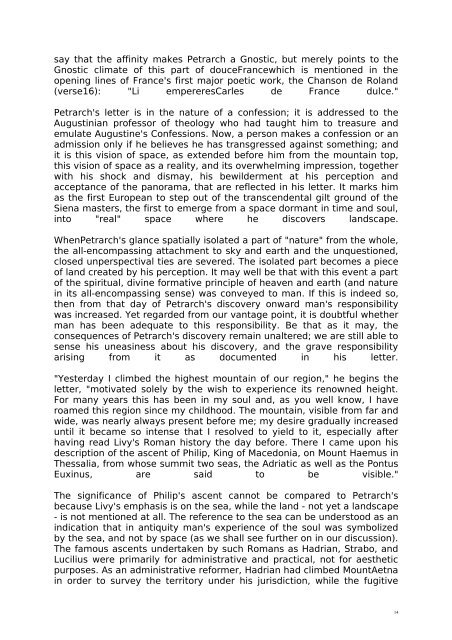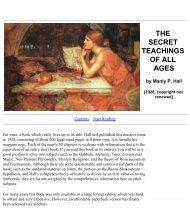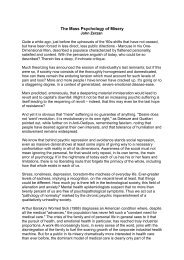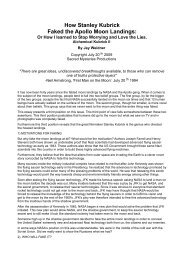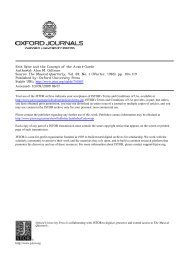The Ever-Present Origin - Michael Goodnight - Editor
The Ever-Present Origin - Michael Goodnight - Editor
The Ever-Present Origin - Michael Goodnight - Editor
- No tags were found...
Create successful ePaper yourself
Turn your PDF publications into a flip-book with our unique Google optimized e-Paper software.
say that the affinity makes Petrarch a Gnostic, but merely points to theGnostic climate of this part of douceFrancewhich is mentioned in theopening lines of France's first major poetic work, the Chanson de Roland(verse16): "Li empereresCarles de France dulce."Petrarch's letter is in the nature of a confession; it is addressed to theAugustinian professor of theology who had taught him to treasure andemulate Augustine's Confessions. Now, a person makes a confession or anadmission only if he believes he has transgressed against something; andit is this vision of space, as extended before him from the mountain top,this vision of space as a reality, and its overwhelming impression, togetherwith his shock and dismay, his bewilderment at his perception andacceptance of the panorama, that are reflected in his letter. It marks himas the first European to step out of the transcendental gilt ground of theSiena masters, the first to emerge from a space dormant in time and soul,into "real" space where he discovers landscape.WhenPetrarch's glance spatially isolated a part of "nature" from the whole,the all-encompassing attachment to sky and earth and the unquestioned,closed unperspectival ties are severed. <strong>The</strong> isolated part becomes a pieceof land created by his perception. It may well be that with this event a partof the spiritual, divine formative principle of heaven and earth (and naturein its all-encompassing sense) was conveyed to man. If this is indeed so,then from that day of Petrarch's discovery onward man's responsibilitywas increased. Yet regarded from our vantage point, it is doubtful whetherman has been adequate to this responsibility. Be that as it may, theconsequences of Petrarch's discovery remain unaltered; we are still able tosense his uneasiness about his discovery, and the grave responsibilityarising from it as documented in his letter."Yesterday I climbed the highest mountain of our region," he begins theletter, "motivated solely by the wish to experience its renowned height.For many years this has been in my soul and, as you well know, I haveroamed this region since my childhood. <strong>The</strong> mountain, visible from far andwide, was nearly always present before me; my desire gradually increaseduntil it became so intense that I resolved to yield to it, especially afterhaving read Livy's Roman history the day before. <strong>The</strong>re I came upon hisdescription of the ascent of Philip, King of Macedonia, on Mount Haemus in<strong>The</strong>ssalia, from whose summit two seas, the Adriatic as well as the PontusEuxinus, are said to be visible."<strong>The</strong> significance of Philip's ascent cannot be compared to Petrarch'sbecause Livy's emphasis is on the sea, while the land - not yet a landscape- is not mentioned at all. <strong>The</strong> reference to the sea can be understood as anindication that in antiquity man's experience of the soul was symbolizedby the sea, and not by space (as we shall see further on in our discussion).<strong>The</strong> famous ascents undertaken by such Romans as Hadrian, Strabo, andLucilius were primarily for administrative and practical, not for aestheticpurposes. As an administrative reformer, Hadrian had climbed MountAetnain order to survey the territory under his jurisdiction, while the fugitive14


